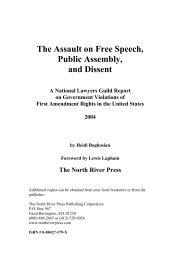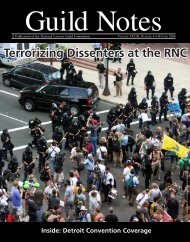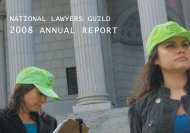Does your library have National Lawyers Guild Review?
Does your library have National Lawyers Guild Review?
Does your library have National Lawyers Guild Review?
Create successful ePaper yourself
Turn your PDF publications into a flip-book with our unique Google optimized e-Paper software.
104 national lawyers guild reviewwe now know what was heretofore only suspected—that orders to torturewent all the way to the top.At the time, only John Ashcroft expressed reservations—not to thewisdom of the policy of aggressive interrogations, but rather about whether“White House advisors should . . . be involved in the grim details,” asking“[W]hy are we talking about this in the White House? History will not judgethis kindly.” 68 These meetings continued after the withdrawal of the infamousBybee torture memo. Even as Secretary Powell expressed concerns that theprogram was hurting the United States’ image abroad, <strong>National</strong> SecurityAdvisor Rice told the CIA: “This is <strong>your</strong> baby. Go do it.” 69The reason for making decisions on the minute details of interrogationsat such a high level stemmed from the CIA’s need for protection. Older CIAagents recalled the agency’s public tarring after the exposure of its PhoenixProgram, which involved torturing and killing thousands of Viet Cong andtheir sympathizers. 70 Field agents worried about potential prosecution 71 andexposure to civil suits. 72 Thus, agents <strong>have</strong> been buying insurance to protectthemselves from litigation costs and liability arising from the use of harshinterrogation techniques. 73Could the officials who ordered the use of torture be prosecuted underthe War Crimes Act? 74 Law Professor Jack Balkin points out that sections8 and 6(b) of the Military Commission Act of 2006 “insulate[s] these officialsfrom liability for many of the violations of the War Crimes Act” 75 andProfessor Marty Lederman also points out that no Justice Department wouldlikely prosecute persons who reasonably relied on a prior Justice Departmentopinion. 76 Finally, the political cost to any succeeding administrationwould likely be too high—such prosecutions would likely sour any attemptto pursue bipartisan legislation. Thus, prosecution would <strong>have</strong> to come fromanother country exercising universal jurisdiction over a former official whohappened to travel to that country.However, no such domestic prosecution is likely. Moreover, no nationis likely to want to prosecute high-ranking U.S. officials on its own usinguniversal jurisdiction as the predicate. The risk of affronting what remainsthe world’s most powerful nation would be enormous. The Obama administrationis not likely to want to see such a precedent set and is likely to resistany such attempt at exercising universal jurisdiction. It is in both the UnitedStates’ and the international community’s interest to pursue closer and betterrelations after January 20, 2009. Prosecution of high Bush administrationofficials would not help in this respect.Any trial of a former administration official would lead directly to a formerpresident of the United States. How likely would any future president,


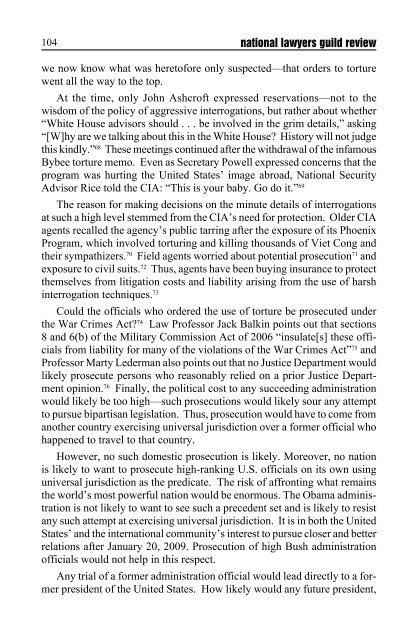
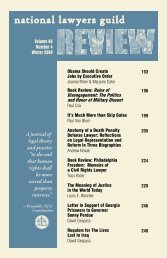

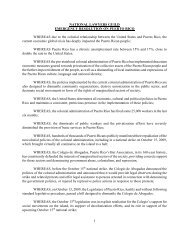
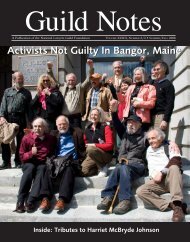
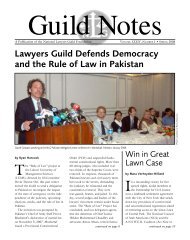
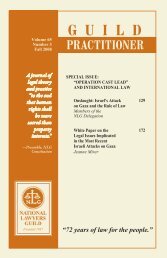

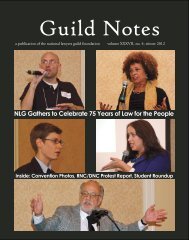
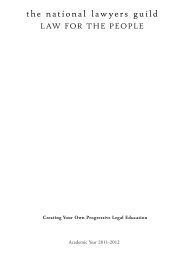
![NLGRev 68-2[1].indd - National Lawyers Guild](https://img.yumpu.com/30820772/1/167x260/nlgrev-68-21indd-national-lawyers-guild.jpg?quality=85)
